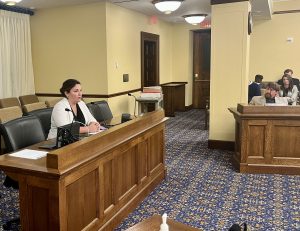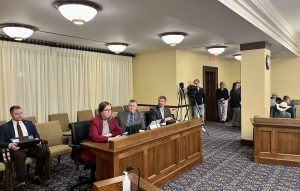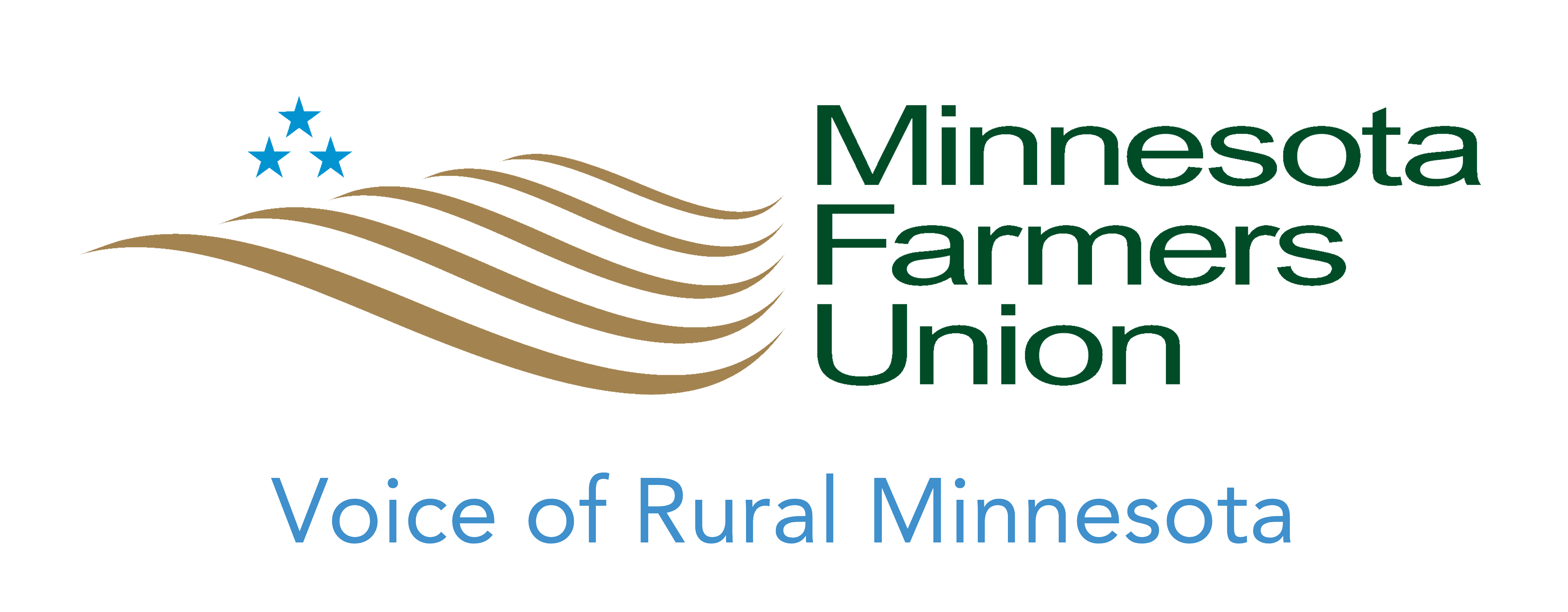Legislative Update: Drafting legislation, recruiting authors
Now two weeks out from our annual Lobby Day Drive-in, MFU leadership and members have testified on issues from Sustainable Aviation Fuel (SAF), to Farm Business Management (FBM), to healthcare affordability. Lawmakers are busy hearing bills that will inform a new biannual budget and, as always, MFU is working to ensure that they’re prioritizing the needs and perspectives of our members.
An important part of the legislative team’s work in these early weeks in session is drafting legislation and recruiting bill authors. For example, the following proposals MFU’s worked on this session are now introduced:
- • Dedicated funding for the Agricultural Growth Research and Investment (AGRI) Program (SF 1172; Kupec (DFL); Dahms (R); Putnam(DFL); Dornink (R))
• Agricultural Right to Repair (HF970; Pursell (DFL); Nelson (R); Frederick (DFL); Allen (R); Cha (DFL); Falconer (DFL); Smith (DFL); Her (DFL); Burkel (R); Kotyza-Witthuhn (DFL))
• Small Ag Homestead Fix (SF1498; Putnam (DFL); Weber (R); Drazkowski (R); Hauschild (DFL))
• Lifting the cap on the Beginning Farmer Tax Credit (SF 1419; Putnam (DFL); Weber (R); Hauschild (DFL))
• Grain license changes (SF 1552; Kupec (DFL); Putnam (DFL); Dornink (R); Westrom (R))
• Funding for the Rural Finance Authority (SF 1209; Putnam (DFL); Westrom (R); Kupec (DFL); Gustafson (DFL); Dornink (R))
Of course, this is just a snapshot of the bills we’re working on this session and more are still yet to be introduced. That said, if you have an interest in seeing any of these passed, please don’t hesitate to send a quick note to your elected representatives. You can find out who represents you in the legislature at www.gis.lcc.mn.gov/iMaps/districts/.
As you’ll see from the authors on this legislation, we’ve strived to ensure that bills are bipartisan. As a reminder, it’s fair to assume that anything that comes out of the session will necessarily be bipartisan. That’s because every bill will need to pass the Minnesota House, and that will require a minimum of 68 votes. Following the March 11 special election to fill a Roseville-area seat that body is expected to return to a 67-67 tie, meaning at least one bipartisan vote will be required for anything that clears the body.
Even outside of those dynamics—and with a one vote margin in the Senate—bipartisanship is a good policy and the sincere interest of many lawmakers.
As noted last week, the conversations members had with their elected representatives during Lobby Day helped inform lawmakers decisions to author bills.
With the House now formally organized and meeting, Republicans who control the body for the coming weeks have started to hold committee hearings. In the agriculture committee, Chair Paul Anderson, R-Starbuck, held a Feb. 10 hearing on Sustainable Aviation Fuel (SAF).

MFU Vice President Anne Schwagerl testifying on Sustainable Aviation Fuel.
MFU Vice President Anne Schwagerl testified on the opportunities and challenges of Sustainable Aviation Fuel (SAF) from the perspective of a grain farmer. While no specific bill was discussed, the hearing focused on the potential impact of SAF on Minnesota agriculture. Legislators also heard testimony from Delta Airlines and Greater MSP, which outlined their strategy for scaling SAF production in the state.
Schwagerl advocated for tax credits and other incentives to position Minnesota farmers at the forefront of this emerging climate-smart market. “This a win-win-win opportunity—we’ve got a new market and are improving our farm, we’re protecting our environment, and we’re helping lower the carbon intensity of a difficult-to-decarbonize sector of a transportation industry,” Schwagerl shared with committee members.
The following Wednesday, Schwagerl also testified in the Senate, encouraging lawmakers to provide additional support for crop research at the University of Minnesota Forever Green Initiative, which seeks to develop and commercialize new perennial and winter annual crops.
Schwagerl explained that Winter Camelina, which the Forever Green developed, “allows us to keep our soil continuously covered throughout the year, protecting our soil from wind and water erosion over our harsh Minnesota winters.”
“This is another crop we can market to help our farm cashflow and support our family,” she said, when voicing support for Sen. Judy Seeberger’s, DFL-Afton, bill to fund Forever Green (SF1220).
In that same Senate hearing, Schwagerl shared MFU’s support for Sen. Kupec’s bill (SF1178) to provide additional funding for Minnesota’s Farm Business Management (FBM) program.
“Supporting faculty with expertise in farm transition planning can help new and emerging farmers start on their careers as well as help families navigate generational farm transfer,” Schwagerl told the committee, highlighting that part of the funding would be prioritized toward farm transition. “That’s a win for not just those families, but also our rural communities that benefit from new farmers on the land.”

Hannah Bernhardt, far left, testified in support of Farm Business Management programs in a House committee
The next week, MFU Pine County President Hannah Bernhardt testified in support of the same FBM proposal (HF653) led by Rep. Nathan Nelson, R-Hinckley, in the House.
Also on the agriculture budget, MFU President Gary Wertish submitted written testimony in support of funding for the Agricultural Utilization Research Institute (AURI), which MFU Executive Committee member, Ted Winter (Nobles County), serves as a Board Member.
“Our members are always innovating and looking for ways to improve their farm business,” Wertish wrote to the Committee. “And whether we get a question related to green fertilizer production, meat processing, or new value-added uses for wool, AURI is always a first call. In turn, their team is responsive and resourceful, not only helping move a project forward, but also creating new connections to technical assistance, funding, or other partners.”
To date, all agriculture budget proposals have been laid over for possible inclusion in an end-of-session budget package (i.e. the omnibus).
MFU members also joined legislative committees to voice their opposition to moving backward on the MinnesotaCare Public Option, which—if implemented—would allow farmers and other small business owners to ‘buy in’ to the coverage available to lower-income Minnesotans. HF27, authored by House Health Finance Chair Jeff Backer, R-Browns Valley, would remove statute and funding authorizing state agencies to apply for the federal waiver necessary to implement a Public Option.
Longtime MFU healthcare leader Cindy VanDerPol highlighted the significant work MFU members have done to make progress on the on a Public Option.
“With so much uncertainty in the healthcare space and continued challenges for families like mine, I don’t know why we’d take this step to limit the state’s options going forward,” she told the House Committee.
MFU Morrison County President Brenda Rudolph shared her experience on MinnesotaCare, highlighting how that coverage helped her get care that could have spared her from an impending health crisis.
“If it wasn’t for Minnesota Care I may not be here today testifying,” she said, advocating for the program to be expanded.
MFU also provided testimony against efforts to roll back MinnesotaCare coverage for undocumented Minnesotans, highlighting the critical role that immigrants play in our food system.
Finally—and while not a budget proposal, but certainly consequential—Hannah Bernhardt and MFU member Tom Smude, Benton County, testified to Senate Agriculture Chair Aric Putnam’s, DFL-St. Cloud, committee on the impact of the federal funding freeze, particularly as it interacts with state programs.
National Farmers Union President Rob Larew highlighted how the funding freeze adds stress and uncertainty to an already stressful and uncertain agriculture economy in his testimony to a United States Senate panel earlier this month.
“We lost a staggering 140,000 farms in the last five years. The average farmer is now nearly 60 years old, and the next generation is too often locked out. The uncertain future of the farm and rural economy adds to anxiety in farm country,” Larew told committee members. “At the same time, farmers and ranchers receive only 15 cents of every food dollar. Consumers are paying higher prices at the store, while family farmers and ranchers are dealing with tight margins, few market options and increased financial pressure.”
NFU followed up with an Action Alert to share stories with the National Farmers Union staff, so they can continue to advocate for sensible implementation of critical Farm Bill programs.
At MFU, we’re also continuing to collect stories from members—including anonymous stories—and relay them to National Farmers Union and our congressional delegation. If you’ve been impacted, please do take 2 minutes to fill out this short form or send us a quick email.
As always, this is just a snapshot of our work at the legislature. If you have questions, thoughts, or concerns about MFU’s legislative work, reach out to stu@mfu.org or (320) 232-3047 (C).
New Merger Guidelines Remain
Federal Trade Commission (FTC) Chair Andrew Ferguson announced this week that the merger guidelines developed by the FTC and the Department of Justice under the Biden administration are in effect and will remain the framework for the FTC’s merger review analysis. The merger guidelines reflect the FTC and DOJ’s interpretation of antitrust law and explain the kinds of mergers the agencies will challenge. The guidelines provide guidance to businesses and are utilized by judges when determining antitrust cases. For example, in blocking the grocery mega-merger between Kroger and Albertsons, Judge Adrienne Nelson cited the new guidelines in making her determination that the merger violated federal antitrust law.
The 2023 guidelines reversed several decades of guidelines that took an increasingly permissive approach to mergers that have resulted in the highly consolidated economy we have today. MFU supported strengthening the guidelines with President Wertish saying at the time, “For decades farmers and rural communities have been increasingly squeezed by corporate monopolies. Updating the existing merger guidelines is a critical step in reigning in powerful corporations and creating a level playing field for farmers, workers and other small business owners.”
MFU Vice President Anne Schwagerl also participated in a virtual event with then FTC Chair Lina Khan and then Assistant Attorney General for Antitrust Jonathan Kanter calling for improvements to the merger guidelines.
The endorsement of the guidelines by Ferguson coincides with a new rule going into effect at the FTC and DOJ that modernizes the merger filing forms certain companies must complete before finalizing a transaction. These are welcome steps that should provide some continuity between the Trump and Biden administrations on the topic of antitrust.
